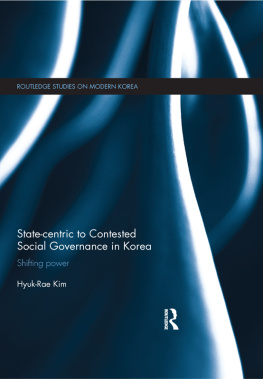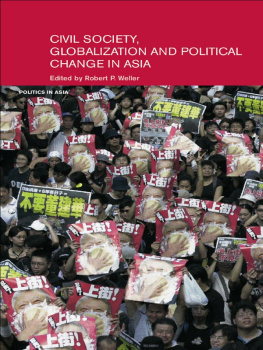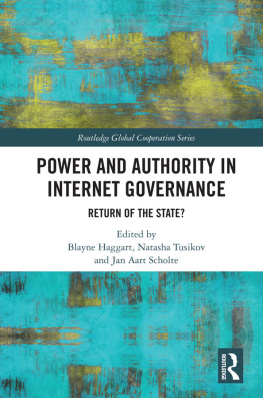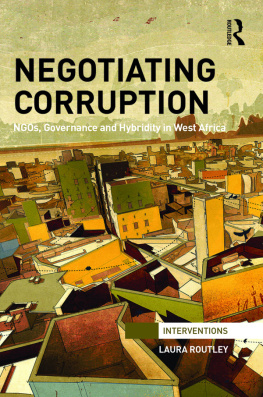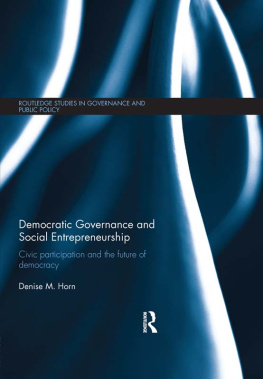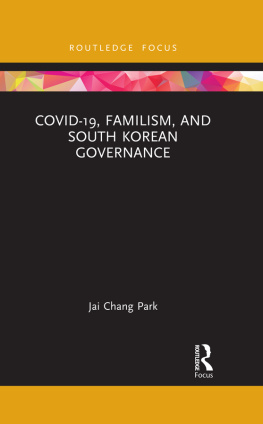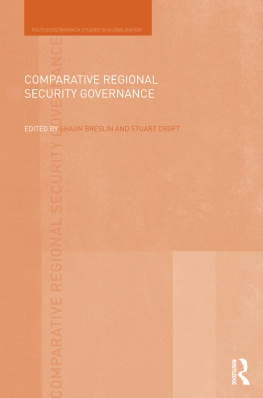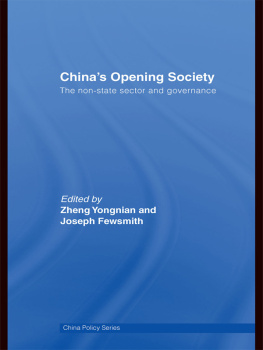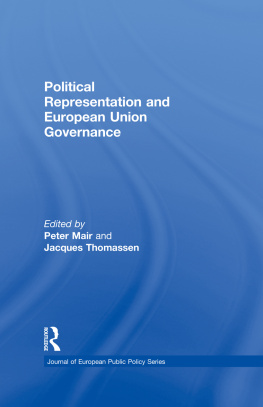State-centric to Contested Social
Governance in Korea
In this interdisciplinary study of governance, Hyuk-Rae Kim traces how civil society and NGOs have evolved over time, how they differ in motivation from their Western counterparts, and the role civil society NGOs have played in consolidating democracy as the governance system in South Korea changes from a state-centric to a contested one.
This book presents civil society's rise in Korea through in-depth analyses of today's most pressing issues, in order to chart the shifting role of a formerly state-centric to a contested governance system in modern Korea. With detailed case studies and policy discussions, this book explores the role of NGOs in campaigning for political reform and the eradication of political corruption; the provision of public goods and services; challenging the government's policies on migration; tackling the issue of North Korean refugees and human rights; and the provision of regional environmental governance. These case studies demonstrate that the state is no longer the sole guardian and provider of public institutions and goods and underline the growing role of civil society in Korea.
Both a study of contested governance and an exploration of contemporary Korean society, this book will be of particular interest to students and scholars alike of Korean politics, East Asian politics, governance, and civil society.
Hyuk-Rae Kim is Professor of Korean Studies in the Graduate School of International Studies at Yonsei University, Korea.
Routledge studies on modern Korea
The Routledge studies on modern Korea Series aims to accomplish the urgent task of advancing and bringing new prosperity to the field of Korean Studies by publishing high-quality manuscripts on a variety of topics pertinent to modern-day Korea, such as social governance, democratization, education, and multiculturalism.
The Series is advised and edited by Hyuk-Rae Kim of the Graduate School of International Studies at Yonsei University, Korea.
State-centric to Contested Social Governance in Korea
Shifting power
Hyuk-Rae Kim
State-centric to Contested
Social Governance in Korea
Shifting power
Hyuk-Rae Kim
First published 2013
by Routledge
2 Park Square, Milton Park, Abingdon, Oxon OX14 4RN
Simultaneously published in the USA and Canada
by Routledge
711 Third Avenue, New York, NY 10017
Routledge is an imprint of the Taylor & Francis Group, an informa business
2013 Hyuk-Rae Kim
The right of Hyuk-Rae Kim to be identified as author of this work has been asserted by him in accordance with sections 77 and 78 of the Copyright, Designs and Patents Act 1988.
All rights reserved. No part of this book may be reprinted or reproduced or utilized in any form or by any electronic, mechanical, or other means, now known or hereafter invented, including photocopying and recording, or in any information storage or retrieval system, without permission in writing from the publishers.
Trademark notice: Product or corporate names may be trademarks or registered trademarks, and are used only for identification and explanation without intent to infringe.
British Library Cataloguing in Publication Data
A catalogue record for this book is available from the British Library
Library of Congress Cataloging in Publication Data
A catalog record has been requested for this book
ISBN: 978-0-415-58745-7 (hbk)
ISBN: 978-0-203-07638-5 (ebk)
Typeset in Times New Roman
by Wearset Ltd, Boldon, Tyne and Wear
For Jung, Dee, and Brian, with love and appreciation
Contents
Figures and tables
Figures
Sectoral interdependence
Percentages of foreign workers by occupation in 2008
Tables
Characteristics of societal sectors
NGO types and functions
Comparison between Southern NGOs and Northern NGOs
Number of organizational types by year, 19092007
Distribution of organizational types, 1994 and 2007
Membership participation in IGOs and INGO is by continents and types, 2007
Membership of INGOs by continents and countries
Change in country participation in INGOs, 1997 and 2007
Distribution of associations, NGOs, and NGO branches
Percentage distribution of NGOs' founding years
Distribution of NGOs focused on public goods
Distribution of NGOs focused on target populations
Percentage distribution of NGO membership size
Percentage distribution of full-time employees
Functions of NGOs
Organizational types and functions of NGOs by sectors
Registered NPOs, September 30, 2010
Number of seats held by parties after the 15th and 16th General Elections
Differences in the turnover rate across the two elections (winners)
Differences in the turnover rate across the two elections (defeated)
Differences between the predicted and actual voting in 22 focused districts
Actions taken by the PSPD
Actions taken by the CCEJ
Petitions submitted to the National Assembly
National Assembly legislation
Changes in age structure
Sex ratio at birth
Sex ratio by age cohort
Foreign workers by status, June 30, 2008
Foreign residents by nationality, June 30,2008
International marriages, 19902007
International marriages by nationality, 19902006
Foreign wives and husbands by nationality
North Korean refugees in South Korea
South Korea's aid to North Korea (unit: 100 million won)
ROKNGOs' activity record by field
Preface
Since the days of my doctoral dissertation, the topic of governance has been continuously the focus of my research. The dissertation featured themes that explored East Asian economic governance, focusing particularly on the institutional arrangements of the national economies in Korea, Taiwan, and Japan. I argued that the three East Asian states had each selected a different organizational form of economic development in pursuit of export-led industrialization, and that their respective strategic choices seemed to have been shaped by interests most pertinent to the political base of the state's dominant agents. In Korea, the formalized and hierarchical relationships between the state and businesses enhanced the role of state officials as senior partners in the implementation of economic policies. Taiwan, in contrast, witnessed the more removed and distant relationships between the minority-dominated state agencies and the native Taiwanese industrial capitalists, which constrained the ability of state officials to implement programmatic plans. And then in Japan, the interdependent, networkbased relationships between state agencies and private businesses increased the organizational capacity of the former to guide the behavior of the latter.
I found that East Asian countries exhibited divergent economic governance, with the organizational mode seemingly shaped by governmental policies and the methods of policy implementation. I also found that the strategic choices of states were embedded in their own history and their distinctive political coalitions. My findings indicate that the universalistic evolutionary scheme based on the convergent logic of organization and industrial efficiency need to be re-examined, and that more emphasis should be given to the distinctive institutional environment within which economic activities take place. Conventional mainstream neo-classical economics fails to acknowledge the role of politics and institutions in shaping the process of economic governance. My analysis also reasserted the need to tread past the distinctive patterns of East Asian economic governance that usually goes under the rubric of the developmental state model. The strength of the developmental state has been an engine for economic success and as such has been regarded as an effective way of steering the national economy, but we need to study features of state structure that advance the debate beyond the simplistic distinction between strong and weak states. Such a distinction does not lend much assistance to understanding the divergent modes of economic governance, and we need to pay more attention to detailed state institutional features that bear on the phenomenon to be explained, and not on a single dimension such as state strength.

